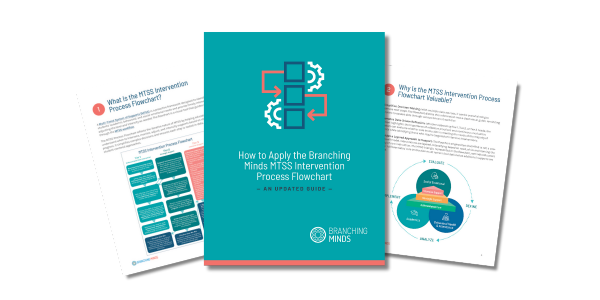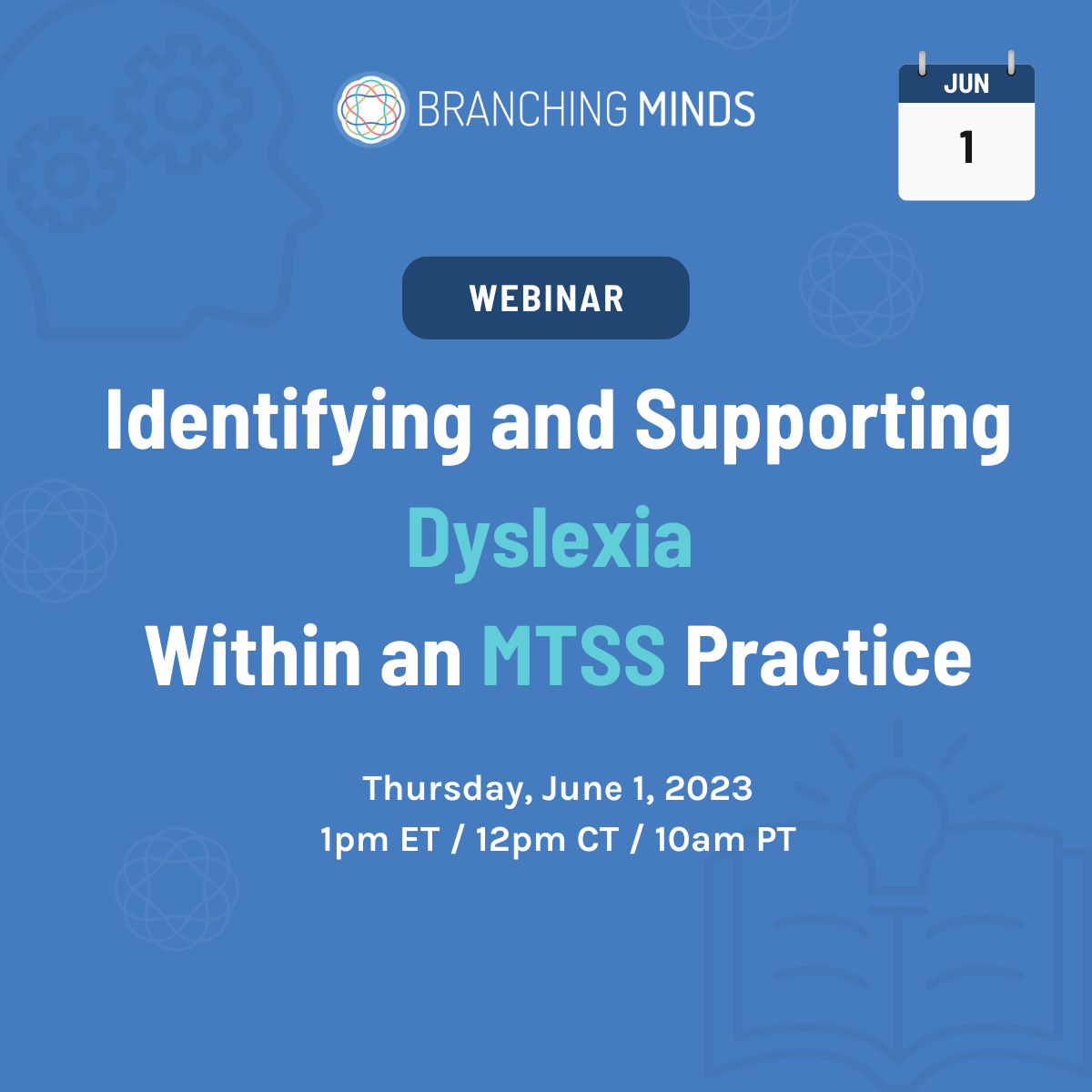
More resources for you

Article
How MTSS Supports Students With Dyslexia
MTSS can help students with dyslexia through universal screening, strong Tier 1 core instruction, progress monitoring, and wellness sup...
Read the article
Don't take our word for it
%20-%20Edited.png?width=2020&height=1300&name=Miamisburg%20City%20School%20District(logo)%20-%20Edited.png)
"The streamlined workflows, intuitive menus, and ability to select interventions and assign tasks simplifies the creation of support plans, ensuring educators can efficiently tailor strategies."
Dr. Laura Blessing
Superintendent, Miamisburg City Schools, OH
.png?width=1082&height=280&name=Indian%20Springs%20School%20District%20109%20(logo).png)
"Branching Minds is the communication tool we were missing for teachers and staff to communicate effortlessly about students with fidelity."
Dr. Christine Baldwin
Director of Curriculum, Indian Springs School District, IL

"In the last year, we’ve grown significantly in our ability to be more responsive to students' needs. We can make every decision we make because of the data that Branching Minds helps us collect and analyze."
Jenn Bognar
Director of Exceptional Learning, Duneland School, IN

"Just in comparison with all the other programs on the market, Branching Minds is honestly the complete package. You have all of the intervention support and guidance."
Emma McBride
Multi-Tiered Systems Specialist, Beaumont ISD, TX

"Investing in tools like Branching Minds that make teachers feel supported/empowered can have a small, positive impact on retention, especially when combined with stability and thoughtful planning."
Audra Bucklin
Principal, Plainfield Elementary School - SAU 32, NH
.png?width=1082&height=280&name=Indian%20Springs%20School%20District%20109%20(logo).png)
"I can easily log in and see how many students have moved between tiers. This streamlined process has made data collection and report preparation more efficient, with everything in one central place."
Dr. Christine Baldwin
Dir. Curriculum & Instruction, Indian Springs School District #109, IL
.png?width=2020&height=1300&name=Miamisburg%20City%20School%20District(logo).png)
"The tier automation ensures students are placed appropriately after being assessed. Teachers can differentiate Tier 1 plans and meet student needs based on these groups or individual assessments."
Dr. Laura Blessing
Superintendent, Miamisburg City Schools, OH

"In Branching Minds, we pull up their charts, we can see what progress is being made, and we can also go to last year’s data easily to see all the history of students and know the next steps."
Jodee Nelson
Title 1 Coordinator and K-3 Reading Interventionist, Lincoln County School District #2, WY

"Branching Minds helps identify resource gaps and offers solutions when district resources fall short."
Audra Bucklin
Principal, Plainfield Elementary School - SAU 32, NH

"With Branching Minds, the meetings are more efficient, the time leads to actual action steps that people carry out."
Christine Downing
Director of Curriculum & Instruction, Plainfield School District, NH
.png?width=200&height=200&name=richardson-isd%20(logo).png)
"We use the family communication letters in Branching Minds that go out when we create a plan, when we invite parents, and progress letters - all within Branching Minds."
Laurel Dickson
Director of MTSS, Richardson ISD, TX

"The visual dashboards are highly effective in showing needs for differentiated instructional approaches."
Angela Plugge
Director of Learning, Waverly School District, NE
.png?width=200&height=200&name=richardson-isd%20(logo).png)
"Administrators can see what programs were used, which supports we're using, how often we’re using them, and whether or not we’re using them with fidelity, which is really important in intervention."
Laurel Dickson
Director of MTSS, Richardson ISD, TX

"Branching Minds does a great job of reaching out to you. Branching Minds has great supportive, patient people who also really understand MTSS."
Angela Plugge
Director of Learning, Waverly School District, NE
.png?width=200&height=200&name=richardson-isd%20(logo).png)
"My staff love the visual aspect of Branching Minds. They love that all the data we need is fed through ClassLink, that we can connect the data, and that they only have to go to one place for all the information they need to support students."
Laurel Dickson
Director of MTSS, Richardson ISD, TX

"What's so great about Branching Minds is it's so teacher-friendly to do what you need to do to support MTSS."
Angela Plugge
Director of Learning, Waverly School District, NE

"We came across Branching Minds and this does much more than house data. It actually gives a platform that's interactive and can address the challenges that are coming up."
Mandy Couturier
Director of MTSS, Harwood Unified Union School District, VT

"Branching Minds is giving us a way to streamline looking at data that's important for decision-making from the student level to the class level to the grade level to the school level."
Mandy Couturier
Director of MTSS, Harwood Unified School District, VT
-1.png?width=246&height=185&name=crooke-county-school-district%20(2)-1.png)
"For any questions I have had with implementation, I used the Branching Minds help feature and the chat. I have had all positive experiences and heard positive feedback from staff about this customer support."
Tina Inghram
MTSS Coordinator, Crook County Schools, WY

"The ability to see progress toward goals with the rate of improvement line is a game changer for teachers. It’s a clear visual."
Angela Plugge
Director of Learning, Waverly School District, NE

"Having the in-person, embedded coaching that Branching Minds did, the presentations, during our first year, were invaluable. It was a huge assistance to us when we were first starting and helped to guide us on how to guide staff because we were all teaching it as well."
Jen Bognar
Director of Exceptional Learning, Duneland School Corporation, IN

"We needed full staff buy-in and a way to make MTSS doable. We needed to look at the whole child, including attendance and behavior, not just focus on progress monitoring data. And Branching Minds was just that."
Emily Myers
Director of MTSS, Orange County School District, NC

"Branching Minds fostered better communication and collaboration across grade levels, teams, and between schools and the central office by providing a shared view of student data, making the entire district more aligned in supporting student success."
Dr. Julie Thompson
Superintendent, Roanoke Rapids Graded School District, NC

"With Branching Minds, we're seeing a whole picture of students across several years - and not just one snapshot. So it is helping us from a district leader lens and a school leader lens to make the right decisions for our students."
Donna Cross
Executive Director of Research Accountability and Data, Evanston-Skokie 65, IL

"I'm excited about our student outcomes, and Branching Minds is part of it. We went from 49% to 73% meeting state standards. 80% of K-3 students are hitting benchmarks, and 90% of Kindergartners."
Angela Plugge
Director of Learning, Waverly School District, NE

"Branching Minds has streamlined our intervention process,making it more efficient."
Marie Stapleton
Lead Title Teacher

"Branching Minds is so intuitive and so user friendly. And I strongly feel that it's a tool that every district should have. "
Leslie Wright
Coordinator of Instructional Supports and Enrichment, Encinitas Union School District, CA
.png?width=2020&height=1300&name=Miamisburg%20City%20School%20District(logo).png)
"The streamlined workflows, intuitive menus, and ability to select interventions and assign tasks simplify the creation of support plans, ensuring educators can efficiently tailor strategies."
Dr. Laura Blessing
Superintendent, Miamisburg City Schools, OH

"Branching Minds is a wonderful platform that is helping to facilitate the MTSS process in my school. I like how Branching Minds streamlines and organizes information about students in one place where everyone who works with the student has access."
Eva Dover
School Psychologist, Orange County Schools, NC

"We tier all of our students in Branching Minds using SELweb data - it's a game changer! The process for progress monitoring and communicating is very clear and systematic. And we're all speaking the same language."
Jennifer Maichin
Former High School Assistant Principal, Mineola UFSD, NY
.png?width=200&height=200&name=richardson-isd%20(logo).png)
"Branching Minds connects everything and makes it so I can see the work that the teacher before me did, or the story of the student, and how much progress they've made over time."
Laurel Dickson
Texas, Richardson ISD, TX

"I like the individual support—Branching Minds will get right on a call with me, and so that's been very supportive."
Jessica Turner
Former Executive Director for Instructional Support, Ossining UFSD, NY

"We considered a whole lot of products, but we could see that with Branching Minds, there was a whole other level of insight and commitment."
Dr. Ann White
Associate Superintendent for Student Services (retired), Charlotte-Mecklenburg Schools, NC

"We found that a lot of the vendors that we were talking with were trying to use their data warehouse platform in an MTSS way, but it wasn't built for MTSS processes, and that's why we ended up going with Branching Minds, because it was built from the ground up for MTSS."
Deana Moss
Director of MTSS, Lakota Public Schools, OH

"The way that plans are set up in Branching Minds has positively impacted and influenced my framework about setting up additional support for MTSS."
Angela Plugge
Director of Learning, Waverly School District, NE

"Branching Minds is the tool that allows you to sustain that MTSS process. When talking about kids, they're not bouncing into different platforms to get data on kids. There's efficiency."
Christine Downing
Director of Curriculum, Instruction and Assessments, Plainfield School District, NH

"Our MTSS team chose Branching Minds because of the ingestion from the different testing sites. That alone would save us a lot of work of going back and forth and finding those scores."
Jodee Nelson
Title 1 Coordinator and K-3 Reading Interventionist, Lincoln County School District #2, WY

"With Branching Minds, the support never goes away. And sometimes I feel like I am the only client because whoever I'm reaching out to gets back to me like that."
Leslie Wright
Coordinator of Instructional Supports and Enrichment, Encinitas Union School District, CA

"Branching Minds gives you exactly what you need to do to accomplish the purpose of MTSS."
Angela Plugge
Director of Learning, Waverly School District, NE
.png?width=1629&height=1632&name=Academy%20for%20Advanced%20%26%20Creative%20Learning%20(logo).png)
"One of the things that we like very much about Branching Minds is that we can look through a library of information to say, Is this going to work?"
Teresa Brown
Academy Director, Academy for Advanced & Creative Learning, CO

"Branching Minds stood out above the rest, providing the features we were searching for and a multi-tiered system of support with interventions. Their team is knowledgeable, efficient, and a pleasure to work with."
Susan Willimas
Director, Information Management Division, State of Wyoming, WY
-1.png?width=246&height=185&name=crooke-county-school-district%20(2)-1.png)
"Branching Minds provides that place for our teachers to put in those plans, create those plans, and make sure that we're monitoring student progress."
Tina Inghram
MTSS Coordinator, Crook County Schools, WY

"My job would be that much heavier if I didn't have Branching Minds. I can start the big, important work that is my job without getting hung up in some of the logistics and some of the weeds because that's all taken care of because we have implemented this platform."
Mandy Couturier
Director of MTSS, Harwood Unified School District, VT

"Branching Minds provides the best support team for any platform I have experienced in my 25 years in education. They are responsive to each question and work diligently to get an answer to each concern and/or issue that arises."
Daniel (Duffy) Besch
Director, Bellefonte Area School District, PA

"We're now discussing the reasons behind placing students in specific tiers and how we can create stronger entry and exit ramps for these services. This approach allows students to achieve the growth they need and exit using interventions tailored to the data input into Branching Minds."
Amanda Allison
Assistant Superintendent Of Pupil Personnel Services, Onteora Central School District, NY

"Branching Minds transformed the way we do MTSS completely. We would not be where we are today without it. We would not have had the good conversation. It has really transformed our district."
Pennie Graeber
RTI and At-Risk Coordinator, Waco Independent School District, TX

"It's a useful tool for staff development, school planning, and parent meetings, providing solid evidence for changes and decisions."
Takiba Thompson
Principal, Warrensville Heights City School District, OH

"The teachers are more informed of student progress than ever before. Branching Minds also listens to its partners. We've given specific feedback throughout the year and noticed that the information has made some adjustments within Branching Minds."
Daniel (Duffy) Besch
Director, Bellefonte Area School District, PA

"Branching Minds can do things like track parent communication, which gets totally lost when a kid transfers grades or buildings. We call it our one-stop shop for all your multi-tiered needs."
Ronda French
Assistant Director of Pupil Services, Medina City School District, OH

"I've been doing this work for 36 years, and I've never come across a tool that encompasses so many things districts truly need and that my staff actually use daily."
Dr. William Crankshaw
Superintendent, Greater Johnstown School District , NY

"Branching Minds can boost teacher satisfaction by showing them the impact of their efforts."
Dr. Julie Thompson
Superintendent, Roanoke Rapids Graded School District, NC
.png?width=2020&height=1300&name=Miamisburg%20City%20School%20District(logo).png)
"We used Branching Minds data to report to our funder, and last year we leveraged it to help write a large federal grant."
Dr. Laura Blessing
Superintendent, Miamisburg City Schools, OH

"One of the best features is the visual dashboard. This view supports efficient communication without having to pull from a variety of documents, spreadsheets, or folders."
Audra Bucklin
Principal, Plainfield Elementary School - SAU 32, NH
.png?width=1082&height=280&name=Indian%20Springs%20School%20District%20109%20(logo).png)
"Branching Minds helps teachers understand with simple visuals to see all student tiers, the content areas where students are not performing, where plans are needed, and progress. It’s improving performance."
Dr. Christine Baldwin
Dir. Curriculum & Instruction, Indian Springs School District #109, IL

"Branching Minds is a place where any person serving that child can either document information or glean further information to help serve that child. That's been the biggest success with information that doesn't get lost in translation, because we start a new school year."
Jeanine Kidwell
Principal, Libby School District 4, MT

"The step by step directions for every process, along with weekly check-in meetings with our data specialist for additional guidance and accountability, set us up for success with implementation."
Amanda Taxis
MTSS Coordinator, Somonauk Community School District 432, IL

"The Early Warning Indicator in Branching Minds is great for high school, tracking attendance, behavior, and failures to identify at-risk students. Our district is proud of our 90%+ graduation rate, and this tool helps us spot students with chronic absenteeism, multiple failures, or behavior issues early, allowing us to provide support before it's too late."
Shannon Thornton
Director of Curriculum & Assessment, Warrensville Heights City School District, OH

"Branching Minds has been instrumental to our success because it forces us to examine our practices at every level, deep dive into what's working, what's not working, and what pieces are missing."
Jenna Blank
RTI Coordinator, Livonia Central School District, NY

"Branching Minds sees its employees’ potential and is always looking for ways to help them grow."
Danielle Filgueiras
Sales Manager, SMB AE & Enablement, Branching Minds
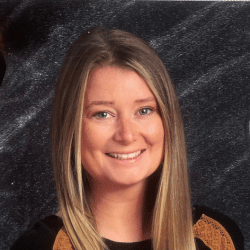
"Branching Minds not only empowers staff and schools to better support their students, but also empowers its employees—both professionally and personally."
Meghan Luther
Sr. Customer Support Specialist, Branching Minds

"Branching Minds has the most amazing team—everyone is incredibly supportive. Whenever I need help, I know exactly who to contact, and they’re always there for me."
Deniqua Antoine
People Operations Manager, Branching Minds

"Our Branchers are some of the most talented, committed, and compassionate people I’ve ever had the privilege to work with—they’re truly what makes this place so special."
Abigail Woodworth
Chief People & Impact Officer, Branching Minds

"All my staff had to do was show up with a smile on their face and their device. To get the quality you get from Branching Minds Meeting Assistant would take you at least an hour. This keeps us focused on the data."
Heather Davis
Special Education Teacher, Unadilla Valley, NY

"I love the Meeting Assistant—it streamlines everything. You can schedule 15 meetings at once, get auto-generated agendas, and make real-time decisions during the meeting. There's less prep, less follow-up, and everything gets done right there."
Rhonda French
Assistant Director of Pupil Services, Medina City Schools, OH

"Branching Minds has given classroom teachers more in-depth knowledge regarding areas in which a student struggles and the intervention tools to help meet their needs."
Kristen Beesaw
Assistant Director of Interventions and 504, Bryan Independent School District, TX

"You brand yourself as a true partnership, and my experience has been just that. It’s a partnership between us and Branching Minds."
Amanda Taxis
Somonauk Community Unit School District, IL

"Even before we had our accounts up and running, I was reading and reading all the different articles and the helpful resources that you offer, but along with that, the people make a difference with Branching Minds."
Laurie Gregory
Director of Educational Services, Eden Central School District, NY

"This is why I was so excited to work with Branching Minds—it gives teachers the tools they need and presents data in a clear, parent-friendly way."
Jennifer Ocana
Head of School, Island Village Montessori, FL

"Branching Minds helps us catch issues early and keep students on track with grade-level content—so support is based on data, not just labels."
Dr. Julie Thompson
Superintendent, Roanoke Rapids Graded School District, NC

"The communication and documentation tools make everything easy to find and keep us transparent and aligned, especially for students with behavior plans."
Jeanine Kidwell
Libby School District 4, MT

"This has been the most on-track platform implementation we've ever experienced with any vendor!"
Stella Reyes
MTSS/504/Dyslexia Coordinator, Compass Rose Public Schools, TX

"The chat feature is very helpful. I get a timely response, which allows me to support teachers when they come to me with questions."
Shujuanana
Educator, Chicago Public Schools, IL

"Branching Minds gives you tools you didn’t even know to ask for—like editable family communication templates. No other company even made me think of that."
Ron Dumais
Technology Educator, Middletown Public Schools, RI
"The expert advice was invaluable, and the resources were abundant."
"There were lots of tangible resources. I made new connections!"
"The Summit was wonderful! The speakers shared great practical and relevant content."
"ALL of the sessions attended had PHENOMENAL information and speakers!"
"I love being able to choose the sessions that are most applicable to me."
"Excellent presenters and great information relayed to us all."
"This was absolutely fantastic. One of the best virtual learning opportunities I have ever attended."
Coordinated Early Intervention Specialist, Special School District, MI
"Reinvigorating! So glad I was able to attend."
School Psychologist, Guilford County Schools, NC
"Great format, great speakers, great sessions."
Director of Student Services, Lakota Local Schools, OH
"Best MTSS learning session I’ve ever attended."
Systems Support Specialist, Aurora Public Schools, CO
"Every session provided information that will be helpful to my school."
MTSS Facilitator, Freeport Public Schools, IL

"Excellent communication and clear lists to complete before and after our meetings."
Stefanie Clarke
Executive Director of Accountability, Planning and Performance, Lee County Schools, NC

"I’ve got a lot of my teachers who deal with intensive behavior support using Branching Minds to track that data… It shows the time of day, frequency, day of the week, location, trigger—it can track it… When the data is presented that way, it makes it so much easier to analyze and respond with appropriate interventions…Every decision we make, we can make on data."
Jenn Bognar
Director of Exceptional Learning, Duneland School Corporation, IN

"The responsiveness of Branching Minds is unmatched. Their support has been a true catalyst for our MTSS work—we wouldn’t be as far along as a district without it."
Taren Hendricks
MTSS Coach, Goshen County School District No. 1, WV

"With Canopy, every team is finally on the same page. The system unifies our data, standardizes our process, and keeps sensitive information secure and accessible."
Stephen Prange
Director of Data, Assessment, and Mathematics, Teton County School District, WY

"Canopy is very intuitive, even without the MTSS Hub courses!"
Sara Council
Director of Student Services, Roanoke Rapids Graded School District, NC
.png?width=570&height=533&name=Johnsburg12%20(1).png)
"Everyone at Branching Minds is so helpful and quick to respond! I truly appreciate their support."
Dawn Barrett
Director of Curriculum, Johnsburg School District 12, IL

"Branching Minds fostered better communication and collaboration across grade levels, teams, and between schools and the central office by providing a shared view of student data, making the entire district more aligned in supporting student success."
Dr. Julie Thompson
Superintendent, Roanoke Rapids Graded School District, NC
"I enjoyed the high quality of presenters. The level of expertise was really impressive."
"This was my first MTSS Summit, and I absolutely loved it!"
"I learned something new each session that allowed me to continue learning."
"I LOVE the passion for learning I witnessed today."
"I appreciated how thorough each presenter was, and I gained valuable insights from every session."
" I appreciated presenters from real districts, sharing their resources with us that they've developed and used in real circumstances."
"I left with strategies that I can immediately apply. Thank you for offering high-quality professional learning that supports MTSS implementation."
"The sessions today had practical application. The content was relevant and informative."

"Branching Minds itself as a platform is really easy to use and navigate. It was really helpful, the data and everything already lived there about the student's profile. For us that helped with the team approach that it didn't fall on one person."
Dr. Jess Plaza
Director of Student Supports and Services, Evanston Skokie, IL

"The ease of the meeting assistant and the information it provides allows us to have more meetings. We're talking about more kids, we're having more conversations. That aligns with our goals of making sure all students are meeting success."
Theresa Donohue
Executive Director of MTSS, Data & Assessments, Plainview-Old Bethpage, NY
.png?width=500&height=500&name=ccsd-branching-minds-mtss-gray%20(2).png)
"Branching Minds not only holds the documentation, it facilitates the process. It allows the team conversations to get to that action-based solution finding."
Trisha Senne
Coordinator of Assessment and MTSS, CCSD59, IL
.png?width=500&height=500&name=ccsd-branching-minds-mtss-gray%20(2).png)
"Because all of our plans live in Branching Minds, we're able to analyze and evaluate whether what we're doing is working from so many different angles.Having our data organized in that way has revamped how we talk about student achievement."
Trisha Senne
Coordinator of Assessment and MTSS, CCSD59, IL

"As we went deeper into literacy, it became clear that MTSS was essential. Without it, we weren’t supporting students as well as we could. MTSS is integral to building a sustainable, effective literacy ecosystem."
Dr. Kelsey Walker
MTSS Coach, Goshen County Schools, WY

"Last year our literacy scores outpaced the state in growth, and for the first time, our student performance triangle is aligned correctly. It showed us that our new curriculums and interventions are effective."
Dr. Julie Thompson
Superintendent, Roanoke Rapids Graded School District, NC

"Our reading specialists can quickly pull up progress monitoring groups and goals, keeping decisions focused on data rather than opinion.Having everything clearly displayed makes it easier to guide discussions and support student success."
Chelsea Bramfeld
Student Support Services Coordinator, Duneland School Corporation, IN

"Teachers see how easy it is to access a student’s data. Being able to quickly see reading abilities, social-emotional data, and more at a glance has been great."
Ron Dumais
Technology Educator, Middletown Public Schools, RI
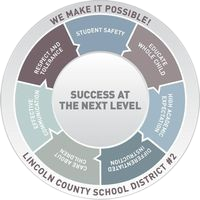
"Everything is in one place…all the reading data is there.It’s helped us streamline what’s important and what we’re looking at."
Jodee Nelson
Title 1 Coordinator and K-3 Reading Interventionist, Lincoln Co School District #2, WY

"We monitor Early Warning Indicators with Branching Minds, looking at academic course failures after the first quarter passes. Based on that data, our secondary teams meet with and develop support plans for those kids — documenting that information and any parent communication in the platform."
Rhonda French
Assistant Director of Pupil Services, Medina City Schools, OH

"We were able to bring in a universal screening tool with Branching Minds. The more we intentionally align these things, the more we ensure a certain level of fidelity of implementation with our school-based teams."
Tessa Barbazon
Executive Director of Student and Family Supports, Clarke County School District, GA

"Branching Minds improved the fidelity of interventions and progress monitoring in our school. As an administrator, I can monitor use and ensure supports are implemented consistently."
Amy Hill
Assistant Principal (retired), Clarke County Schools, GA

"Branching Minds has been the game changer for us to make MTSS a true whole child system of support. Without it, we would not be as far along as we are and we wouldn't see our kids thriving as they are because we are able to have a system that pulls us all together for us. It would take so much time, we spent years and so many hours trying to create our own and Branching Minds has it all."
Karen Arnett
Director of Teacher and Student Support, Springs Charter Schools, CA

"We found a key component in Branching Minds that has our social emotional learning support and our behavior supports. We were able to make instructional adjustments using the Branching Minds data in coherence with the teacher's data, and it helped to better support the student. Now we're not losing as much instructional time as we were with some of our frequent flyers."
Robyn Brandon
Reading Specialist, Danville Public Schools, VA

"Having a platform like Branching Minds just makes it so easy to understand why we're doing what we're doing. Everything is all in one place. There's so many little pieces that gives us that full picture and everyone that works with that student has access to that. So that helps us achieve what we need to do to help the kids achieve."
Josie Giannini
Interventionist, Lee School, Norridge School District, IL
Ready to Make Student Support Simpler and Stronger?
Discover how Branching Minds streamlines MTSS, empowers educators, and improves student outcomes, starting today.
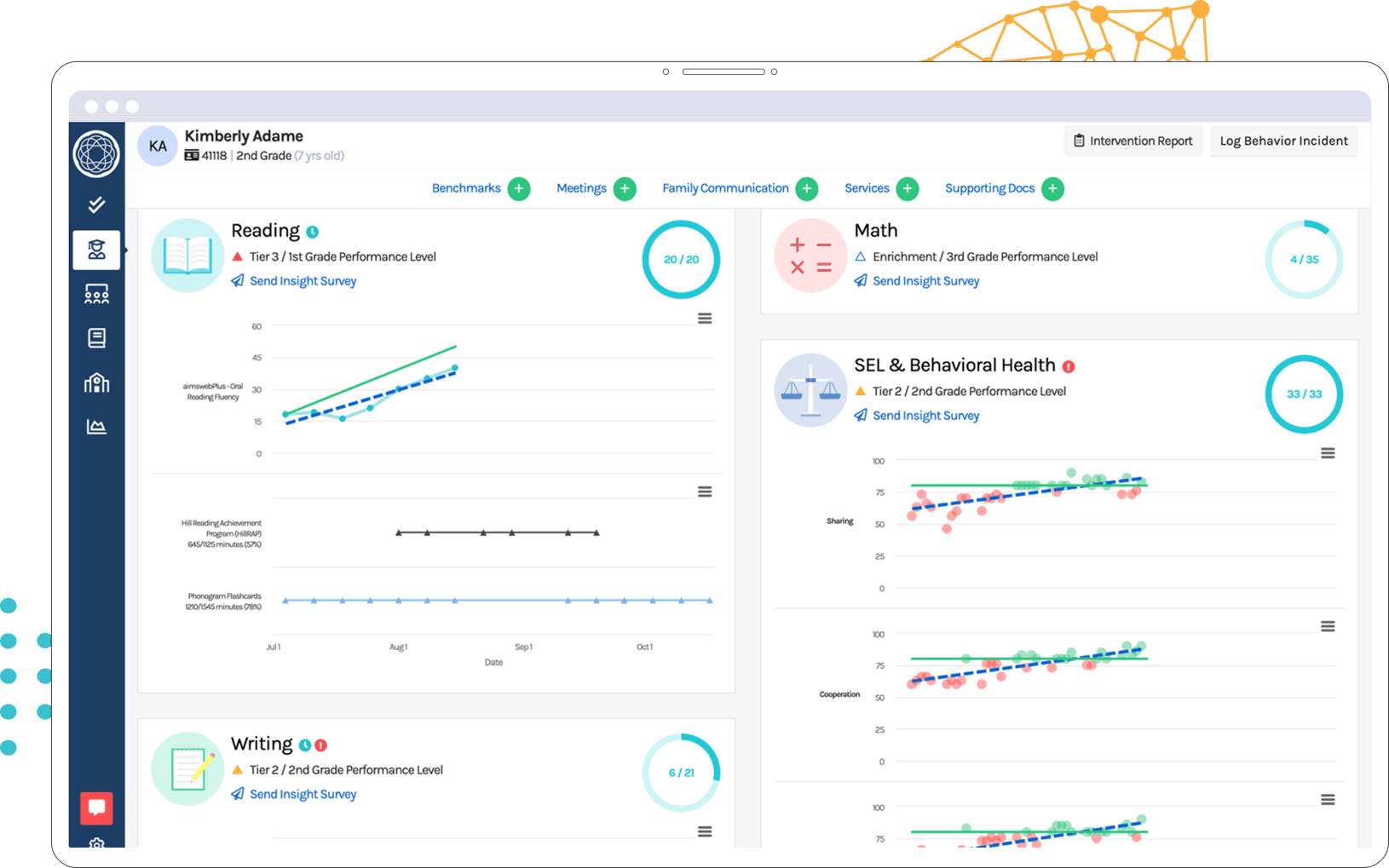












.png?width=500&height=500&name=Addressing%20Foundational%20Reading%20Skills%20in%20MTSS%20(preview).png)
